Navigating and Double-Checking Data on OFA
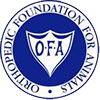
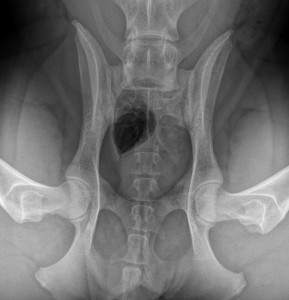
In numerous Social Media groups, websites, and breed club pages you often read that one should double-check information stated by breeders regarding the health testing completed on their dogs on OFA. But how does one actually do that? Here we'll break out the basics of navigating OFA.org on a personal computer. The mobile version is similar enough.
The Orthopedic Foundation for Animals ("OFA") is a non-profit research foundation and database with affiliation with the American Kennel Club, meaning that OFA information will appear on AKC records if the parents have been permanently identified by microchip. It is one of the largest public canine health databases. Users are primarily from the USA and Canada, although results may be submitted from anywhere. OFA is the also body that issues CHIC certification. The Canine Health Information Center ("CHIC") is a database within a database, comprising of dogs who have completed and publicly listed all the exams as recommended by the national breed club. It does not mean that the dog has normal results for the exams. One needs to examine the results of the relevant tests individually in order to determine the results. The CHIC initiative is one that is breed-specific and with a mandate on the open sharing of results, whether pass or fail.
A few background facts about OFA:
OFA provides both interpretations on specific exams, as well as hosting a public database.
* For a number of exams, the exam/results are not interpreted by OFA but simply accepted for posting on OFA's database. For CsV, this includes eye exams, cardiac exams, dentition exams, and the DNA tests for Degenerative Myelopathy (DM) and Pituitary Dwarfism (DW). These tests are performed by a veterinarian and the results are simply sent to OFA to post on their public database. This means that there may be instances in which a breeder has chosen, for whatever reason, not to submit the information to OFA, although the exams have been performed.
* CAER Eye exams and OFA Advanced Cardiac exams results are forwarded to OFA by the practicing veterinarian for data and research purposes, independent from the owner's choice to have those results listed on OFA's public database. However, in order to appear on the public database, the owner must submit their Owner's Copy to OFA.
* The exams that OFA itself provides interpretations for are the evaluations for Hip Dysplasia and Elbow Dysplasia. These radiographs are sent to 3 randomized veterinary radiologists out of about a national pool of 20. For preliminary results (<24 months old dog), Hip and Elbow results are only posted if the owner has agreed to list both passing and non-passing evaluations. For adult evaluations >24 months, all passing exam results are automatically posted. The owner, however, can request that non-passing exams not be listed. There is no option to de-list passing adult evaluations. However, OFA also accepts listings from PennHIP, another hip evaluation method, which means that owners that have elected to use PennHIP may not have results that appear on the OFA database, unless the owner has chosen to send those results to OFA.
* OFA keeps statistics on disease prevalence based on submitted results, whether the owner has elected to make them public or not.
* Exams that are valid for one year and are meant to be serially repeated are the adult-onset portion of the Advanced Cardiac exam, as well as the CAER eye exam, as these are phenotypical exams that track development of diseases that may not have identified genetic causes, are multi-factorial in origin, et al.
Let's get started. Head on over to www.ofa.org. Click on the upper right-hand side "Search OFA Health-Tested Dogs", then click on "Advanced Search".
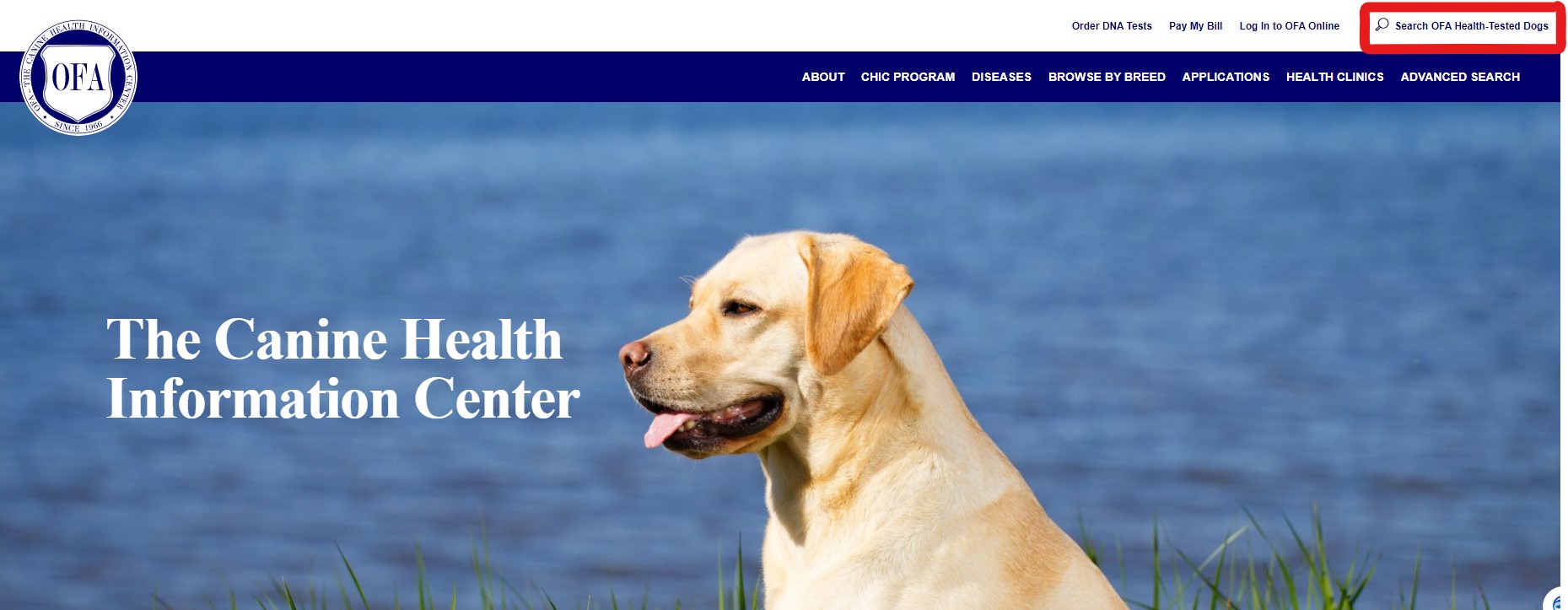
This is where the registered name of the dog comes into play. A registered name usually consists of two parts, the given name and kennel, and it's basically the equivalent of a formal birth certificate name. You can think of the kennel name as a "last name" or a "family name". Litter ads should at minimum ALWAYS include the registered names of the parents for this reason - it's the formal name which health tests, show and sporting results will be linked to.
The OFA database has thousands and thousands of entries from hundreds of breeds and multiple species, many with similar names. Entered data can also contain typos. There's a variety of reasons why an exact name match may not show up. For that reason, we recommend doing a 'fuzzy' search using the Advanced Search in order to properly narrow down the results. First, choose Czechoslovakian Vlcak on the Breed search parameter. Then, we suggest entering just the kennel name for the dog in question, selecting also the checkbox for "Any Part of Name" as the kennel name can be either a prefix or an affix. There's a variety of options here, for example, you can narrow it down to only dogs with CHIC numbers, or for results of specific tests, date range, etc. For the purposes of this, we're just doing a search for a specific dog. In some foreign kennel clubs like ENCI/Italian KC, a kennel name is not available for registration until a breeder has already bred a number of litters. If a kennel name is generic or doesn't exist, try to search within the CSV breed using a unique part of the given name. If the registration number is available instead, try entering that in the "Registration # of dog/litter" without any spaces or symbols. We've put in the kennel affix "Greyfarer" for this test.
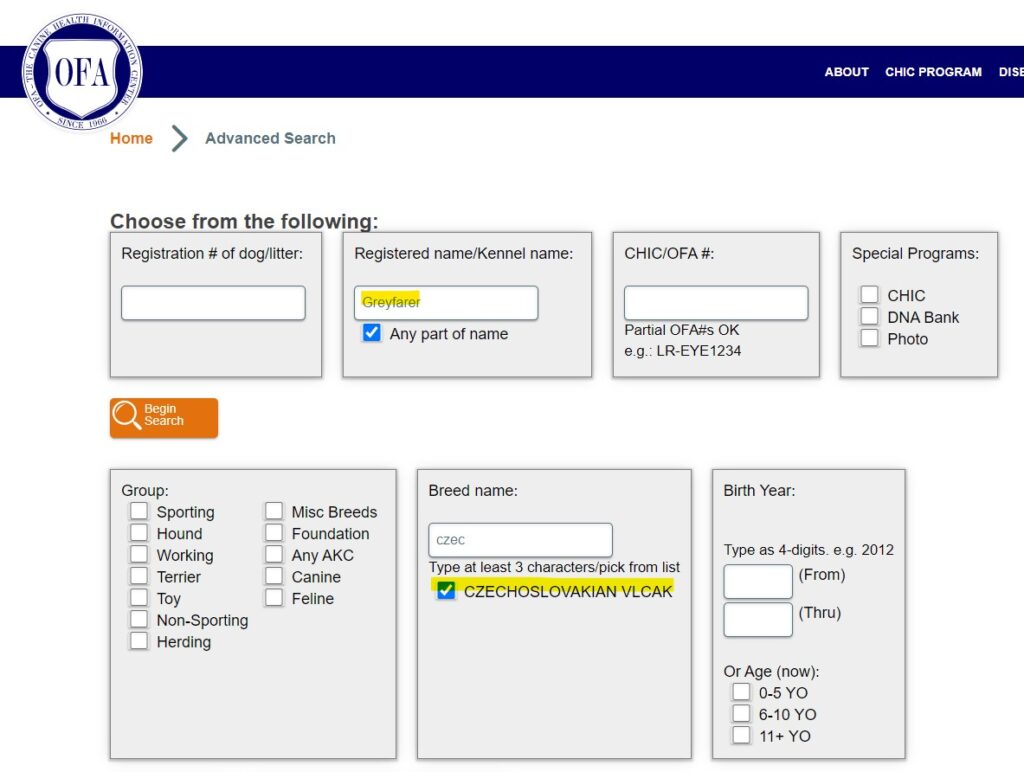
Using the parameters stated above, these are the search results below. As you can see, several dogs are prominently listed with a purple CHIC icon. This means these dogs have completed the breed-specific tests and have also shared those results publicly. Litters born in the USA should have at least the dam listed with a CHIC number. The sire should also have a CHIC number unless it is a foreign-sired litter.
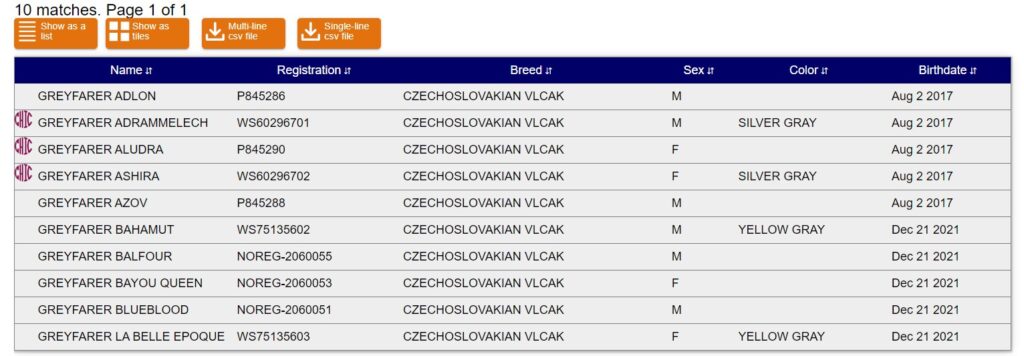
The CHIC requirements for Czechoslovakian Vlcak are as follows (May 2023):
Mandatory: Hip Dysplasia (HD), Elbow Dysplasia (ED), Degenerative Myelopathy (DM), AVCO Eye Exam, Dentition, DNA bank repository
Optional: Cardiac evaluation, Pituitary Dwarfism (DW)
As discussed earlier, a CHIC designation doesn't mean that the dog has normal results. To check on actual result, click on the dog's name. Since we are planning a litter with Ashira, we've decided to use her as an example.
The information contained on OFA's database is comprehensive, listing the date of the exam, the date when it was accepted for listing by OFA, the age of the dog, et al. There are a few key points to keep in mind. Of course the "Conclusion" column is self-explanatory, but in case you are not familiar with the tests, you can look at whether or not an OFA number was issued. OFA numbers are issued for all exams with normal results. When a result is not within normal bounds, the "OFA Number" column will indicate that. In regards to DM and DW DNA results, clear and carriers are issued OFA numbers. There are a number of results which appear in italics on the listings. Italics indicate that the exam has expired. Eye and Cardiac (adult on-set) exams are, as previously stated, valid only for 1 year. However, the cardiac exam will not appear italicized even when expired, because all cardiac exams also evaluates the presence of congenital defects, which is valid for the lifetime of the dog. One should proceed down the list to see if an update has been performed.
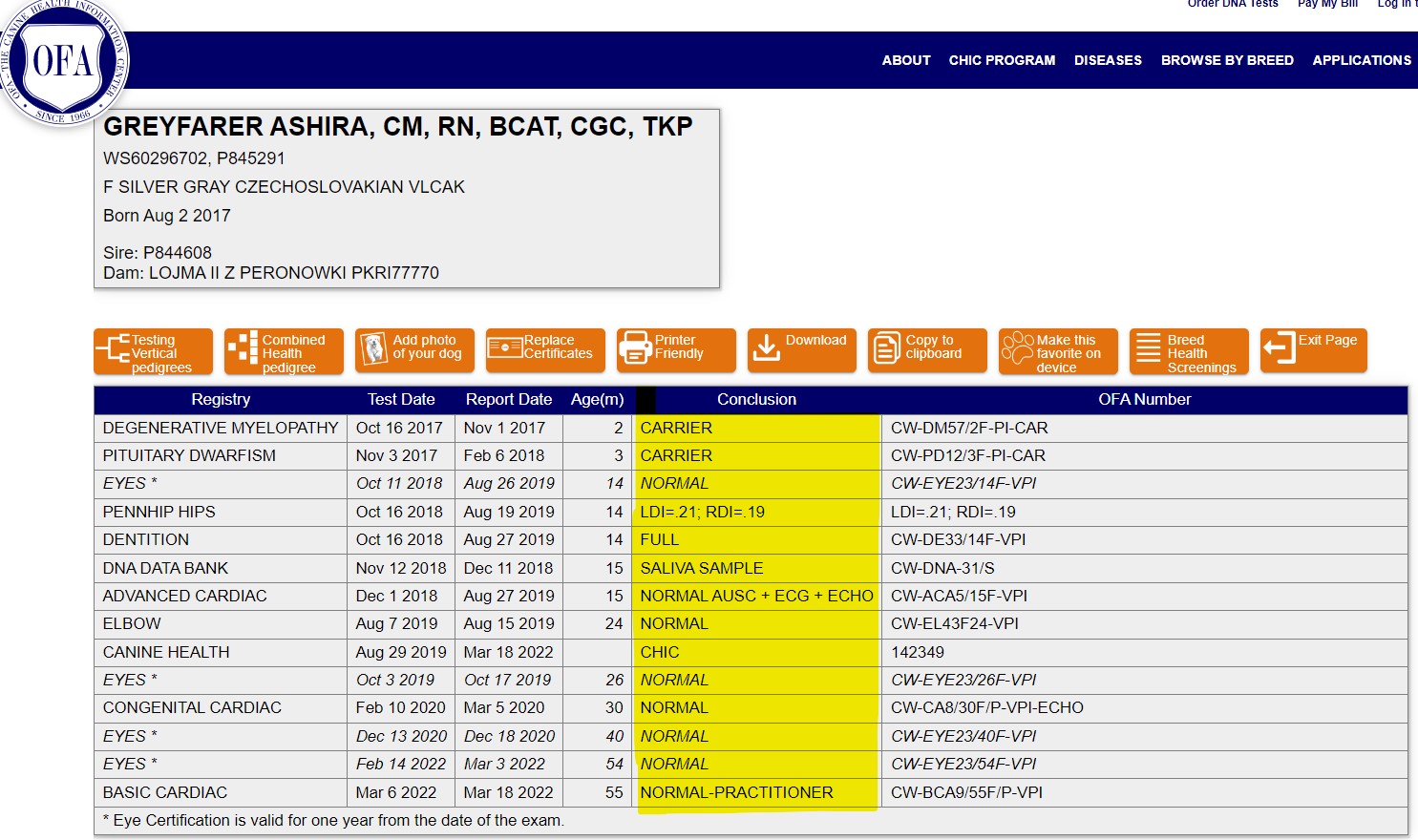
As you can see, Ashira currently is missing updated eye and cardiac exams on OFA - no worries! They are currently being updated this year.. you can check later 😉
And that's all there really is to it!
There are a few caveats to who or what will not appear on OFA:
*Dogs residing outside of the USA and Canada. Although anybody can use OFA from anywhere, many countries' kennel clubs have their own methods of recording results. We will further discuss this below.
* With the exception of PennHIP, dogs residing in the USA should at minimum have OFA hip and elbow results listed on OFA's database, as these are exams that are evaluated by OFA itself. Results of other breed-relevant exams (Eye, Cardiac, DM, DW, dentition) may not appear if the owner has not sent in this information. However, you should ask yourself - isn't it valuable breed information to have records for posterity, to be able to research various lines in the future? To list these exams with OFA there is a $15 fee. It's not overtly burdensome.
Help! I still can't find the dog on the database!
If you still can't find a US-residing dog on the database, consider asking the breeder directly for the OFA link. In the absence of that, perhaps you should reconsider that breeder.
I'm thinking to import a dog. What should I check if not OFA?
Luckily, both breed clubs for Slovakia and Czech Republic, the countries of origin, have public lists for males and females which have met the breed club requirements for breeding. This includes mandatory health testing and results, as well as bonitation, and in Slovakia, also SVP1, so it's easy to look up whether parents have met these minimum parameters.
Slovak stud males and Slovak breeding females can easily be found here.
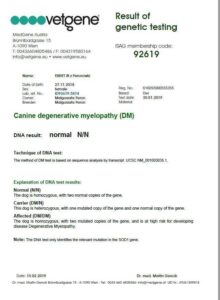
For import from other countries, ask for a copy of the FCI certificate for HD and ED. In some kennel clubs this is stamped directly onto the registration and pedigree. For DM and DW you can ask for the certificates from the testing laboratory. Eye exams are currently mandatory only in Germany, although many dogs in Slovakia have also been screened due to an initiative by Dr. Zubricky, a veterinarian with a special interest in ocular diseases who has hosted eye clinics at the summer specialties.
Of course health information is only a minimum necessity when considering litters. The breeding and pedigree are even more important. We're happy to advise on importing and double-checking litters and breeders - just send us a PM! We're most easily reached through our Facebook page. Hope that this little basic walkthru will be useful to folks!
